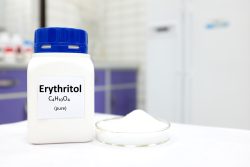 Recent research indicates that erythritol, a widely used zero-calorie sweetener in various low-carb and no-sugar products, may elevate the risk of blood clots, strokes and heart attacks. Common in the ketogenic diet, erythritol is utilized not only as a sweetener but also as a thickener in numerous products, including snack bars, baked goods, candy, and ice cream.
Recent research indicates that erythritol, a widely used zero-calorie sweetener in various low-carb and no-sugar products, may elevate the risk of blood clots, strokes and heart attacks. Common in the ketogenic diet, erythritol is utilized not only as a sweetener but also as a thickener in numerous products, including snack bars, baked goods, candy, and ice cream.
Erythritol, which occurs naturally in fruits such as pears, watermelons, and grapes and vegetables, is now processed and is used extensively as a food additive to enhance sweetness and flavor. It is approximately 70% as sweet as sugar, and is derived from fermenting corn or wheat starch.
In the study, 20 participants were divided randomly: 10 drank water containing 30 grams of erythritol, and the other 10 consumed water with 30 grams of glucose. The researchers selected 30 grams as it represents a typical amount found in foods containing erythritol. The results noted that 30 minutes after individuals drank water sweetened with erythritol they exhibited signs of increased levels of proteins that promote platelet clumping in their blood. Out of all the subjects tested it was found that erythritol-sweetened beverages increased clotting risk and alter platelet function. This reaction was not seen by participants who drank water sweetened with regular sugar.
Amidst the rising obesity epidemic, artificial sweeteners like erythritol are more frequently included in soft drinks, diet foods, and various processed items. Health and weight-loss experts commonly suggest it as a sugar substitute for people with high cardiovascular risk factors, including obesity, diabetes, or metabolic syndrome.
Regrettably, erythritol is not efficiently metabolized by the body, leading to its accumulation. Previous studies have indicated that individuals at higher risk for heart disease who had elevated erythritol levels were twice as likely to suffer a major cardiac event within three years compared to those with lower levels.
Recently, the World Health Organization recommended against the use of artificial sweeteners due to lack of evidence that they aid in sustaining weight loss and potential health risks. These guidelines are intended for the general population, excluding individuals with preexisting diabetes. Erythritol is often suggested for diabetic patients because it does not elevate blood sugar and helps prevent cavities and oral health issues.
This study highlights concerns that a typical portion of food or drink sweetened with erythritol could immediately trigger clot formation. Erythritol and other related sugar substitutes, frequently used as alternatives to sugar, warrant further investigation for potential long-term health impacts, particularly as these effects are not observed with sugar.
To view the original scientific study click below:
Ingestion of the Non-Nutritive Sweetener Erythritol, but Not Glucose, Enhances Platelet Reactivity and Thrombosis Potential in Healthy Volunteers





